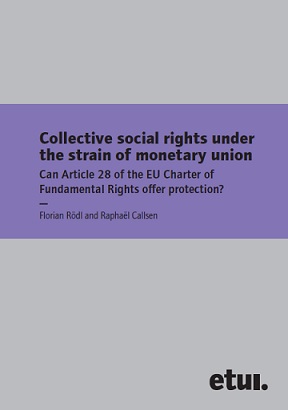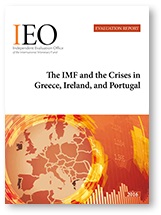Rödl, Florian, Callsen, Raphaël, (2016), “Collective social rights under the strain of monetary union”, ETUI This report examines in depth the legality of the measures taken by the European Union, alongside the European Central Bank (ECB) and the International Monetary Fund (IMF), in the wake of the financial and debt crisis. Beginning with a factual presentation of the European Union’s post-crisis agenda, which has focused on a flexible, productivity-based wage policy, …Read More
Is Europe spending too much?
Djankov, Simeon, (2016), “Is Europe spending too much?”, LSE Europpblog, 28 July Yes, it is, according to Simeon Djankov. He notes that public expenditures had risen to dangerously high levels in some Southern and Western European countries even prior to the eurozone crisis and argues that the European Central Bank’s loose monetary policy since 2012 has provided public sectors with little incentive to modernise. This, in turn, may be helping to fuel Eurosceptic …Read More
The IMF and the Crises in Greece, Ireland, and Portugal
Independent Evaluation Office of the IMF, (2016), “The IMF and the Crises in Greece, Ireland, and Portugal”, IEO-IMF, July A series of crises hit several euro area countries from 2010 to 2013. The crises, coming so soon after the global financial and economic crisis of 2007–08, and occurring in a common currency area comprising advanced and highly integrated economies, posed extraordinary challenges to European and world policymakers. This evaluation assesses …Read More
From brain drain to brain circulation: How labour mobility can help less developed European regions
Crescenzi, Riccardo, Holman, Nancy, Orrù, Enrico, (2016), “From brain drain to brain circulation: How labour mobility can help less developed European regions”, LSE Europpblog, 29 July One of the potential problems created by the free movement of people is that skilled workers are drawn toward more developed areas, undermining the development of their own regions. As Riccardo Crescenzi, Nancy Holman and Enrico Orrù write, this process, commonly referred to as ‘brain drain’, can present a …Read More
What’s New About Today’s Low Interest Rates?
Reinhart, Carmen, (2016), “What’s New About Today’s Low Interest Rates?”, Project Syndicate, 28 July A day seldom passes without articles appearing in the financial press pondering why interest rates have remained so low for so long. This is one of those articles. So let’s start by clarifying whose and which interest rates are low and what is and isn’t novel or unprecedented. Interest rates in emerging and developing countries are importantly affected …Read More
Europe’s crises and the EU’s ‘big three’
Krotz, Ulrich, Maher, Richard, (2016), “Europe’s crises and the EU’s ‘big three’”, West European Politics, Volume 39, Issue 5, 14 June This article examines the impact and significance of the Crimea–Ukraine–Russia and the eurozone crises on relations among and between the EU’s three biggest member states – Britain, France and Germany – as well as their individual influence and roles within the EU. The Ukraine and eurozone crises have revealed and intensified three …Read More
On the Distribution of the Welfare Losses of Large Recessions
Krueger, Dirk, Mitman, Kurt, Perri, Fabrizio, (2016), “On the Distribution of the Welfare Losses of Large Recessions”, Centre for Economic Policy Research, July How big are the welfare losses from severe economic downturns, such as the U.S. Great Recession? How are those losses distributed across the population? In this paper we answer these questions using a canonical business cycle model featuring household income and wealth heterogeneity that matches micro data from …Read More
Governance of the European Monetary Union: Recasting Political, Fiscal and Financial Integration
Jones, Erik, Torres, Francisco, (2016), “Governance of the European Monetary Union: Recasting Political, Fiscal and Financial Integration”, Routledge, 7 June The crisis in the euro area is a defining moment in the history of European integration. It has revealed major flaws in the architecture of the European Union; it has challenged European institutions to shape an appropriate response; and it has tested the patience of a European public that is eager to …Read More
Automatic stabilisers for the euro area: what is on the table?
Spath, Nathalie Julia, (2016), “Automatic stabilisers for the euro area: what is on the table?”, Jacques Delors Institute, 30 June This Policy paper contributes to the debate on how to equip the euro area with a mechanism for asymmetric shocks absorption. It responds to the challenge of automatic stabilization and adds to potential solutions by analysing the promises and problems of automatic stabilization mechanisms for the euro area. The Policy paper …Read More
Understanding the Circular Economy in Europe, from Resource Efficiency to Sharing Platforms: The CEPS Framework
Taranic, Igor, Behrens, Arno, Topi, Corrado, (2016), “Understanding the Circular Economy in Europe, from Resource Efficiency to Sharing Platforms: The CEPS Framework”, CEPS, Special Report No. 14, July This paper aims to rethink the concept of the ‘circular economy’ through the prism of its relevance to its many stakeholders, ranging from public and private actors and mature and emerging industries to cities and regions, SMEs and multi-sectoral corporations. The paper presents …Read More







